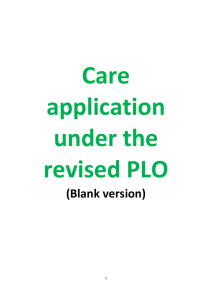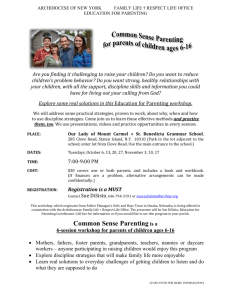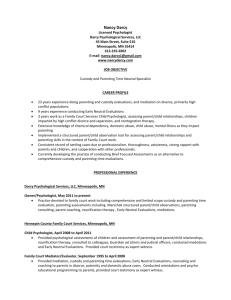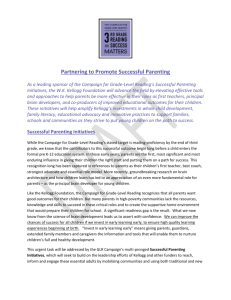Family Engagement School Readiness Goals Area: Family Well
advertisement
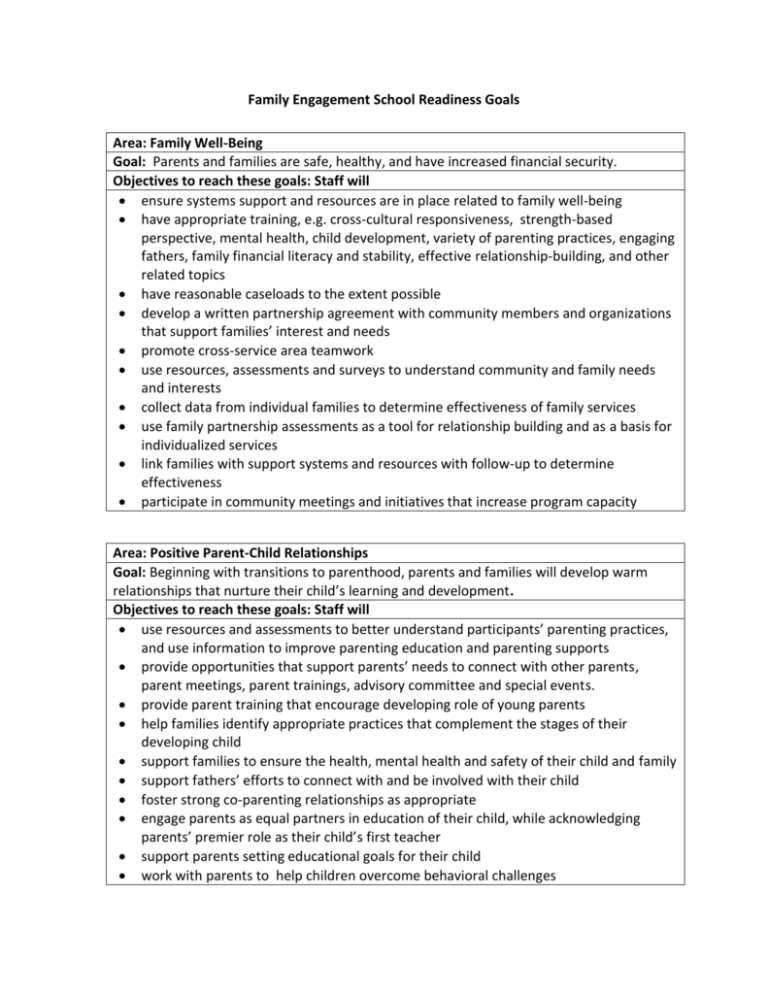
Family Engagement School Readiness Goals Area: Family Well-Being Goal: Parents and families are safe, healthy, and have increased financial security. Objectives to reach these goals: Staff will ensure systems support and resources are in place related to family well-being have appropriate training, e.g. cross-cultural responsiveness, strength-based perspective, mental health, child development, variety of parenting practices, engaging fathers, family financial literacy and stability, effective relationship-building, and other related topics have reasonable caseloads to the extent possible develop a written partnership agreement with community members and organizations that support families’ interest and needs promote cross-service area teamwork use resources, assessments and surveys to understand community and family needs and interests collect data from individual families to determine effectiveness of family services use family partnership assessments as a tool for relationship building and as a basis for individualized services link families with support systems and resources with follow-up to determine effectiveness participate in community meetings and initiatives that increase program capacity Area: Positive Parent-Child Relationships Goal: Beginning with transitions to parenthood, parents and families will develop warm relationships that nurture their child’s learning and development. Objectives to reach these goals: Staff will use resources and assessments to better understand participants’ parenting practices, and use information to improve parenting education and parenting supports provide opportunities that support parents’ needs to connect with other parents, parent meetings, parent trainings, advisory committee and special events. provide parent training that encourage developing role of young parents help families identify appropriate practices that complement the stages of their developing child support families to ensure the health, mental health and safety of their child and family support fathers’ efforts to connect with and be involved with their child foster strong co-parenting relationships as appropriate engage parents as equal partners in education of their child, while acknowledging parents’ premier role as their child’s first teacher support parents setting educational goals for their child work with parents to help children overcome behavioral challenges Area: Families as Lifelong Educators Goals: 1. Parents and families will be involved in the everyday learning of their children at home, school, and in their communities. 2. Parents and families will advance their own learning interests through education, training and other experiences that support their parenting, careers, and life goals. use assessments and surveys to improve staff-family relationships and to strengthen family literacy practices, and family options for GED, training, certificate, and degree programs include teaching staff in parenting education sessions to share about child learning and development, and program curriculum invite parents to volunteer in their child’s classroom provide information and support to parents in working toward their own literacy goals connect with families to gather child information and parent observations to inform teaching – social, emotional and cognitive development and the importance of the home language (with DLL children) share information about approaches that promote positive child outcomes and school readiness goals support parents understanding of child assessment information and progress toward individual goals connect families with community resources that support children’s learning and development, e.g. library, museums share information with families about resources and services for children with disabilities assist families with their education and training goals, and provide referrals to educational resources support family literacy activities between parents and children form partnerships with educational resources and adult educators Area: Family Engagement in Transitions Goal: Parents and families will support and advocate for their child’s learning and development as they transition to new learning environments ,preschool, kindergarten. Objectives to reach these goals: Staff will conduct joint transition trainings between preschool and kindergarten staff include parents in transition activities ensure families know their rights under IDEA share information about activities and interactions that promote school readiness as defined by Kentucky and Head Start ensure families have ongoing opportunities to discuss their observations and concerns about their child’s strengths and challenges develop and maintain partnerships among preschool and kindergarten staff support the development of parents’ advocacy skills Goal: Parents and families will participate in formal or informal social networks that are supportive and/or educational and that enhance social well-being and community life. Objectives to reach these goals: Staff will use assessments and surveys to improve practices related to parent connections, peers and community participate in training related to parent goal setting, learn about transitions, and parent leadership and advocacy provide regularly scheduled parent events provide skill-building volunteer opportunities Area: Families as Advocates and Leaders Goal: Parents and families will participate in leadership development, decision-making, program policy development, and/or in community and state organizing activities to improve children’s development and learning experiences. Objectives to reach these goals: Staff will ensure parents’ voices are heard and included in program planning processes, e.g. policy council, parent committees, and DLL surveys use assessments and surveys to improve practices related to parent leadership/advocacy create an environment that welcomes and affirms parent leadership and advocacy
